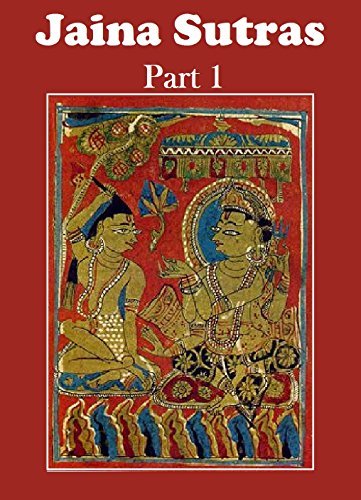Acaranga-sutra
by Hermann Jacobi | 1884 | 71,211 words | ISBN-10: 8120801237 | ISBN-13: 9788120801233
The English translation of the Acaranga Sutra, which represents the first the 12 Angas in Shevatambara Jainism. It is traditionally dated to the 5th-century BCE and consists of two parts containing lectures based on the teachings of Mahavira. Topics include: lifestyle of an ascetic: conduct, behavior, collecting alms, clothes, mode of walking and ...
Lecture 1, Lesson 10
A single mendicant, having collected alms for many, might, without consulting his fellow-ascetics, give them to those whom he list; as this would be sinful, he should not do so. Taking the food, he should go there (where his teacher &c. is) and speak thus: ‘O long-lived Śramaṇa! there are near or remote (spiritual) relations of mine: a teacher, a sub-teacher, a religious guide, a Sthavira, a head of a Gaṇa, a Gaṇadhara, a founder of a Gaṇa; forsooth, I shall give it them.’ The other may answer him: ‘Well now, indeed, O long-lived one! give such a portion!’ As much as the other commands, thus much he should give; if the other commands the whole, he should give the whole. (1) A single mendicant, having collected agreeable food, might cover it with distasteful food, thinking: ‘The teacher or sub-teacher, &c., seeing what I have received, might take it himself; indeed, I shall not give anything to anybody!’ As this would be sinful, he should not do so.
Knowing this, he should go there (where the other mendicants are), should put the vessel in his out-stretched hand, show it (with the words): Ah, this! ah, this!' and hide nothing. (2)
A single mendicant, having received some food, might eat what is good, and bring what is discoloured and tasteless; as this would be sinful, he should not do so. (3)
A monk or a nun on a begging-tour should not accept any part of the sugar-cane[1], whether small or large, pea-pods, seed-pods, of which articles a small part only can be eaten, and the greater part must be rejected; for such things are impure and unacceptable. (4)
A monk or a nun on a begging-tour should not accept meat or fish containing many bones, so that only a part of it can be eaten and the greater part must be rejected; for such meat or fish, &c., is impure and unacceptable. (5)
A monk or a nun on a begging-tour may be invited to meat or fish containing many bones, (by the householder who addresses him thus): ‘O long-lived Śramaṇa! will you accept meat with many bones?’ Hearing such a communication, he should say, after consideration: ‘O long-lived one! (or, O sister!) it is not meet for me to accept meat with many bones; if you want to give me a portion of whatever size, give it me; but not the bones!’ If after these words the other (i.e. the householder) should fetch meat containing many bones, put it in a bowl and return with it, (the mendicant) should not accept such a bowl, whether out of the other’s hand or a vessel[2]; for it is impure and unacceptable. But if he has inadvertently accepted it, he should not say: ‘No, away, take it!’ Knowing this, he should go apart, and in a garden or an upāśraya, where there are few eggs, &c., (all down t o) cobwebs, eat the meat or fish, and taking the bones, he should resort to a secluded spot and leave them on a heap of ashes, &c. (see II, 1, 1, § 2). (6)
If a householder should fetch fossil salt or sea salt, put it in a bowl and return with it, a monk or a nun on a begging-tour should not accept it out of the other’s hand or vessel; for, &c.
But if he has inadvertently accepted it, he should return with it to the householder, if he is not yet too far away, and say, after consideration[3]: ‘Did you give me this with your full knowledge or without it?’ He might answer: I did give it without my full knowledge; but indeed, O long-lived one! I now give it you; consume it or divide it (with others)!'
Then being permitted by, and having received it from, the householder, he should circumspectly eat it or drink it, and what he cannot eat or drink he should share with his fellow-ascetics in the neighbourhood, who follow the same rules of conduct, are agreeable, and not to be shunned; but if there are no fellow-ascetics, the same should be done as in case one has received too much food.
This is the whole duty, &c.
Thus I say. (7)
Footnotes and references:
[1]:
They are detailed in the original: aṃtarucchuyaṃ, a piece between two knots; ucchugaṃḍiyaṃ, a piece containing a knot; ucchucoyagam (?), ucchumeragaṃ, top of a stalk; ucchusālagaṃ, long leaf; ucchuḍālagaṃ, fragment of a leaf.
[2]:
Parahatthaṃsi vā parapāyaṃsi vā. This is a typical phrase, and seems rather out of place here.
[3]:
Āloejjā, he should show, would perhaps be better.
